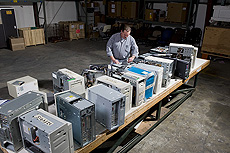Computer recycling program earns top marks nationally

Fermilab started a PC Center four years ago to redistribute used
computer components to other departments. In FY08, 480 Computing Division
computers were redistributed to the Accelerator Division.
During the last fiscal year, Fermilab more than doubled the amount of used electronics disposed of in three categories: donations to schools, sales to recyclers and reuse on site.
That increase between FY07 and FY08 of nearly 400 percent helped Fermilab earn the federal Electronics Reuse and Recycling Campaign award.
On hand at the White House Dec. 16 to receive the award will be Fermilab employees Eric Mieland, environmental management systems coordinator; Jack Kelly, manager of the Property and Inventory Control Department; Bruce Chrisman, chief operating officer and DOE employees Joanna Livengood, Fermilab site office manager; and Sally Arnold, environmental scientist.
Across the country 124 federal facilities competed for the award. Fermilab previously received similar accolades, but this marks the first time the laboratory has won the three-year-old ERRC award.
"Everyone at the lab should be proud of this recognition, which results from the involvement and environmental consciousness of all staff and users," Chrisman said.
Fermilab's seven-year-old computer recycling program got a boost in the last few years from the Computing Division's switch to farms of personal computers rather than mainframe-type systems. Improved access for schools to used computers also helped.
The computer farms have added to the amount of components sold to industrial recyclers and held down laboratory purchasing costs through a reuse program.
In FY08, the Computing Division recycled 480 computers from these farms to use in upgrades in the Accelerator Division.
An online marketing system that lets schools order computer parts from across the country has resulted in requests for Fermilab computers rising from almost nothing to a request for 142 components in FY08.
Computer parts now end up as far away as Texas, although nearby schools, including those in Chicago and both Aurora high schools, take the majority.
"I don't see recycling in any of these three areas decreasing because we are going to keep buying more computers for scientific uses," Kelly said.
"Fermilab has been a leader in pollution prevention activities for many years," Livengood said. "It is exciting to see the laboratory being recognized with one of the national federal electronics stewardship awards."
-- Tona Kunz |